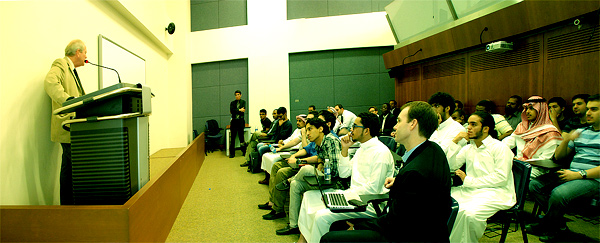Professor Charles Choguill, Vice Provost for Academic Affairs at Alfaisal University, while speaking at a University Seminar on Monday, raised serious doubts concerning the long-term sustainability of Riyadh. His arguments were based on the cost of water made available to Riyadh’s residents at a highly subsidized price, the availability of oil which is increasingly used to generate electricity domestically, and the over consumption of the population which has resulted in a ecological footprint that is currently five times the size of Switzerland.
While praising Saudi ingenuity in developing the world’s leading desalinated water technology, Choguill questioned the expense involved in producing water by such means and then transporting it 437 km from the Arabian Sea to Riyadh. Once the water arrives in Riyadh, the cost recovery by the water agency amounts to only 1% of the cost, the remainder being a subsidy that is only possible because of revenue earned by exporting petroleum to the world.
That being the case, Choguill then asked about whether this was a good use of this non-renewable resource? Although it is thought that recoverable oil reserves amount to 267 billion barrels, there is some doubt as to whether this is the case and how much of this oil can be recovered. In addition, however, given the volatility in the price of oil, using this revenue to subsidize urban consumption is a questionable policy.
Finally, given the increasing Saudi use of its own oil (per capita consumption of oil is higher in Saudi Arabia than in the USA!), particularly for the generation of electricity, the question arises as to whether in the longer term oil will be available for export. A recent study has suggested that given current trends in petroleum production and exports, Saudi Arabia may be an oil importer by as early as 2030.
The final area for examination was consumption of Riyadh’s residents, based on a model developed at the University of Vancouver in the early 1990s, the ecological footprint. This model computes the land and water areas required to support a population’s consumption and to absorb the wastes that are generated. This is then compared with the biocapacity of the local environment. If there is a deficit, it suggests that the population is consuming more than its global share of resources. Since 1976, the data show that Saudi Arabia has been in a deficit situation. Currently, it has one of the highest ecological deficits in the world.
In order to bring about a return to balance, certain urban policies are needed urgently. User charges should be initiated to remove subsidies and give consumers some idea of the true cost of their consumption. Excess consumption in terms of large villas, roads, cars and appetites as well as excess waste -water and electricity, should be eliminated in recognition of the very sensitive desert environment in which Riyadh is located.
Finally, there is a need to reduce the population in Riyadh as a means of reducing consumption levels. One approach might be to eliminate expatriates, although this would obviously have a serious effect on Saudi quality of life. Yet, Choguill stated, the choice appears to be quite stark. If one does not reduce consumption, loss of sustainability would have an equally serious impact on local quality of life, as the viability of Riyadh would vanish.







